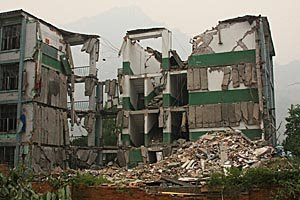
And the schools fell down like cardboard in a rain. While the buildings around stood. Who built the schools? Who torments Tibet even as it cannot provide rescue for the people of the region?
Quake Quiets the Critics of China's Human-Rights Record
By NICHOLAS ZAMISKA
May 20, 2008
HONG KONG -- In the aftermath of the deadly Sichuan earthquake, the clamor of criticism that had been dogging China over human-rights issues and its policies toward Tibet has suddenly been silenced.
The deaths of at least 34,000 and as many as 50,000 people from the quake has unleashed a groundswell of sympathy from overseas. That has forced some critics of the Beijing government, including activists who had organized protests during the Olympic torch relay, to think twice about their tactics.
"It's almost like after Sept. 11," says Joseph Cheng, professor of political science at the City University of Hong Kong. "You can't criticize the Bush administration's policy on Sept. 12. You make your criticisms later."
Before the earthquake, China's image abroad had taken a beating. The first big blow came from news of violence in Lhasa and ethnic Tibetan areas elsewhere in China, and the government crackdown that followed. Impressions only worsened when protesters of all stripes, including those opposed to China's policies toward Tibet and others eager to link its investments in the Sudan with atrocities in Darfur, converged on the Olympic torch relay in London, Paris and San Francisco.
But the earthquake has, in a sense, shelved the debate over China's track record, altering the political calculus.
"The tone of advocacy has to change because of the earthquake," says Jill Savitt, director of Dream for Darfur campaign, which has been protesting China's support of the Sudanese government. "It would really be unwise and unstrategic to continue to pound on China and not to realize that there have been hundreds of thousands of people who have been killed and wounded. It would be foolhardy."
When Liu Guijin, special representative on African Affairs of the Chinese Government and China's point person on Darfur, visited the U.S. last week to press his government's case, activists intentionally demurred from overt public protests, according to Ms. Savitt. "There could have easily been demonstrations in front of those buildings," she says, adding that demonstrations were not "even a thought, no one even suggested it."
After months of scathing critiques over Beijing's treatment of political dissidents, Human Rights Watch hasn't issued a statement about China since the earthquake. The silence is "partly a function of the earthquake, but not exclusively," according to Sophie Richardson, Asia Advocacy director for Human Rights Watch.
"The question becomes, Are we all pulling our punches?" says Ms. Richardson. With such a large natural disaster, and one where the government appears to be earnestly trying to help its people, she says, "one certainly stands down for a bit in part out of sympathy and respect and tact," but also because strategically it may be difficult to draw attention to human-rights abuses when everyone is focused on humanitarian relief.
Of course, expressing sympathy during a time of crisis doesn't necessarily imply political backtracking. French President Nicolas Sarkozy had riled the Chinese government by suggesting that he might not attend the Opening Ceremonies on Aug. 8, given the apparent stalemate in Tibet.
Then Mr. Sarkozy visited China's embassy in Paris on Monday to express France's solidarity and sympathy after the May 12 earthquake.
A spokesman for Mr. Sarkozy said Monday France's president hasn't changed his position about whether to attend the Opening Ceremonies. "The Olympic Games and the terrifying earthquake are two different things," the spokesman said.
While the mood seems to have shifted, at least momentarily, it is unclear whether the outpouring of sympathy that the earthquake has provoked will run dry before the Games begin just over 11 weeks from now.
"When you see Hu Jintao or Wen Jiabao with their arms around an eight-year-old, it tends to soften people's images. It just does," says Eliot Cutler, managing partner at the Beijing office of Akin Gump Strauss Hauer & Feld LLP, a law firm that advises clients on crisis management and public policy. "How long is this going to last? I don't know."
--David Gauthier-Villars in Paris contributed to this article.
Write to Nicholas Zamiska at nicholas.zamiska@wsj.com


No comments:
Post a Comment